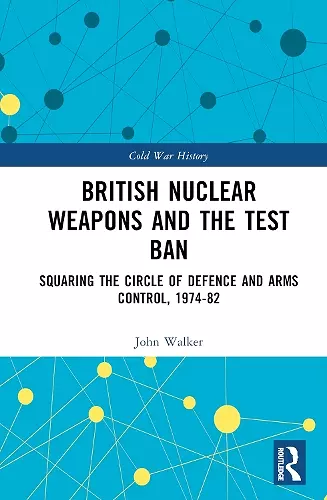British Nuclear Weapons and the Test Ban
Squaring the Circle of Defence and Arms Control, 1974-82
Format:Hardback
Publisher:Taylor & Francis Ltd
Published:5th May '23
Currently unavailable, and unfortunately no date known when it will be back
This hardback is available in another edition too:
- Paperback£39.99(9781032451640)

This book provides an overview of how the UK tried to maintain and modernize its strategic and tactical nuclear weapons during 1974-82, whilst also pursuing a comprehensive nuclear test ban treaty.
The core question addressed in the book is how a test ban treaty would impact on the reliability and safety of the UK’s nuclear weapons and how this would constrain and limit efforts to secure a comprehensive treaty that would prohibit nuclear testing indefinitely. An added complication lay in the fact that a ban treaty could also prevent or limit the UK’s ability to test new warhead designs to replace its existing tactical nuclear weapons and a new strategic successor system to Polaris. How all of this played out between 1974 and 1982, when the UK announced its decision to acquire Trident and the US decided that a test ban treaty was no longer in its security interests, is discussed. A detailed review, based on the available materials in the UK National Archives, also looks at the aims and objectives of UK nuclear tests in Nevada and on the decisions taken on the Chevaline warhead and its Trident replacement. The book also considers whether there was a far greater threat to the UK nuclear programme from shortages of skilled craftsmen and industrial action at the Atomic Weapons Establishment at Aldermaston than from a test ban treaty. It also looks at whether nuclear defence trumped arms control objectives during this period.
This book will be of much interest to students of British politics, nuclear proliferation and Cold War History.
'Based on his unique experience as a senior civil servant in the arms control field, Dr Walker’s masterly study highlights the attempt by British governments between 1974 and 1982 to pursue the apparently contradictory policies of supporting a comprehensive test ban treaty, while simultaneously seeking to modernise and maintain the reliability and safety of UK nuclear weapons. Using a wide range of government archives he explains why it proved impossible to ‘square the circle’, with the nuclear deterrent ultimately being given priority. This excellent analysis of a neglected area of British nuclear history has significant contemporary relevance and deserves to be read by policy makers and academics interested in the vitally important field of nuclear decision-making.'
John Baylis,Emeritus Professor, Swansea University, UK
'Arms Control moves slowly, and many of today’s challenges still rhyme with the past. John Walker’s account of tensions between UK nuclear weapons policy and non-proliferation goals in the 1980s offers lessons in how complex political, technical and defence considerations have shaped the story of the CTBT.
Technical and practical developments around the CTBT have been considerable in the forty years since the events that Walker describes. But 25 years after the Treaty opened for signature, echoes remain of vexing problems that prevented progress on a treaty for so long in the twentieth century. Some could yet pose difficulties for the CTBT and its effective verification. Many in the arms control community know of these issues, but memories fade. Walker’s meticulous review of UK archives has assembled an "insider" analysis that puts in sharp relief the tension between a test ban and national reliance on nuclear weapons. It recalls challenges that have since been largely (but not completely) overcome. the result is of more than historical interest.'
Malcolm Coxhead,Former Director CTBT and Disarmament Australian Safeguards and Non-Proliferation Office, Australia
‘John Walker’s compelling book is not only a valuable contribution to the scholarship of nuclear policy, but extremely timely. In this very readable analysis, he describes the competing priorities of nuclear safety and the transatlantic relationship during a crucial period of the Cold War, helps the reader see the mechanics of the inner workings of government as policy is devised and implemented and describes how consensus began to form around the desirability and practicability of a Comprehensive Test Ban Treaty – which would eventually bear fruit in 1996. As he explains, the British state faced the twin challenges of modernising its nuclear deterrent while simultaneously working towards a ban on the testing of nuclear weapons – and he shows us the means by which successive governments sought to square that circle in concert with the US and USSR. These twin imperatives continue to preoccupy policymakers today, and Dr Walker’s account offers real lessons and precedents that can be applied, valuably, in the current climate.’
Des Browne,UK Secretary of State for Defence 2006-2008, UK
'John Walker’s authoritative British Nuclear Weapons and the Test Ban offers a well-researched and sober analysis of British nuclear policies and decisions in the 1970s and 1980s that offer important lessons on the tensions between nuclear deterrence and the pursuit of arms control that resonate at a time when fears of nuclear use are rising and the bilateral and multilateral arms control architectures are facing extreme pressures.
Joseph Pilat,Global Fellow, Woodrow Wilson International Center for Scholars, Washington DC, USA
ISBN: 9781032451633
Dimensions: unknown
Weight: 453g
174 pages